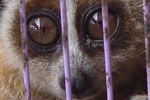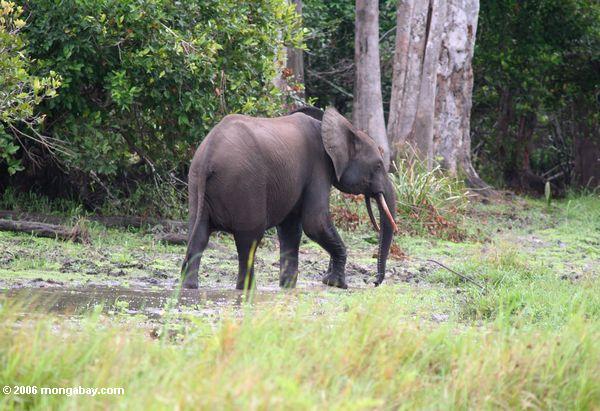Forest elephant in Gabon. Photo by: Rhett A. Butler.
The Republic of the Congo sentenced an ivory smuggler to an unprecedented four years in prison, proving the government’s rising willingness to crack down on poachers. The wildlife trade has been decimating elephant populations in the Congo, while a recent report from the Wildlife Conservation Society (WCS) asserts further stringent measures are needed to counter the globally-linked criminal syndicates that largely responsible for the ivory trade jeopardizing wild elephants.
Congolese officials arrested the thirty-five year old Chinese trafficker in January as he attempted to return to Beijing with five elephant tusks, three ivory carvings, 80 ivory chopsticks, and many smaller ivory pieces. The smuggler attempted to conceal the ivory paraphernalia in aluminum sheets, but law enforcement officials with the Ministry of Sustainable Development, Forest Economy, and the Environment noted the unusual luggage.
“We are still a long way away from protecting Africa’s elephants from irreverent trafficking networks dependent on weak enforcement policies, but a sentence like this is a morsel of hope if its merit can be conveyed to policy makers and its seriousness communicated to illegal traffickers,” explained Naftali Honig, coordinator for the Project for the Application of Law for Fauna (PALF), which provided technical assistance to Congolese officials.
The smuggler’s sentence, handed down August 10 by the Brazzaville high court, may provide momentum to the 61st meeting of the UN Convention on International Trade in Endangered Species (CITES) held in Geneva this month through September eighth. To date, corruption and ineffective wildlife law enforcement have hampered efforts to save Central African wildlife.
Ivory is a status symbol in China, and demand for tusks has surged with economic growth as the newly rich seek to buy ivory chopsticks, hairpins, traditional name seals, and other luxury items. In 2005, CITES Secretariat ranked China as “the single most important influence on the increasing trend in illegal trade in ivory since 1995.” The Environmental Investigation Agency (EIA) states, “Chinese demand for ivory is directly responsible for the renewed poaching crisis facing many African elephant populations.” High demand from China makes the illegally ivory trade increasingly profitable—and criminal.
“We are rapidly losing big, spectacular animals to an entirely new type of trade driven by criminalized syndicates. It is deeply alarming and the world is not yet taking it seriously. When these criminal networks wipe out wildlife, conservation loses, and local people lose the wildlife on which their livelihoods often depend,” explains Elizabeth Bennett, author of the WCS study.
Before CITES banned the international commercial ivory trade in 1989, demand for ivory helped reduce the African elephant population from 1.3 million to 600,000. The elephant population of Chad now numbers only 400, a drastic reduction since 1979, when 15,000 elephants roamed the country. Recently, Cameron and the Democratic Republic of Congo (DRC) have seen their elephant populations diminish greatly. Forest elephants have found relative shelter in Gabon and Congo, but the renewed ivory trade is now bludgeoning these populations as well.
Forest elephants, which roam much of the Congo rainforest, are smaller in size and sport straighter tusks than savanna elephants. Long considered a subspecies of their savanna cousin, some scientists have recently argued that the forest elephant is in fact a unique species. Given poaching intensity in Central Africa, forest elephants are likely more imperiled than savanna.
“Unless we start taking wildlife crime seriously and allocating the commitment of resources appropriate to tackling sophisticated, well-funded, globally-linked criminal operations, populations of some of the most beloved but economically prized, charismatic species will continue to wink out across their range, and, appallingly, altogether,” said Bennett.
Related articles
Conservation groups kicked out of CITES debate on elephants
(08/17/2011) The Standing Committee of CITES (Convention on International Trade in Endangered Species of Wild Fauna and Flora) tossed conservations NGOs out of the room during a debate on the rise in elephant poaching for illegal ivory. A vote of seven to six sent conservation groups making up the Species Survival Network (SSN) packing, however the groups were allowed back in before the day was over.
How to fight organized wildlife crime in East Asia

(07/27/2011) Organized criminal syndicates are wiping out some of the world’s most charismatic wildlife to feed a growing appetite for animal parts in East Asia#8212;and so far governments and law enforcement are dropping the ball. This is the conclusion from a new paper in Oryx, which warns unless officials start taking wildlife crime seriously a number of important species could vanish from the Earth.
A message to poachers: Kenya burns elephant ivory stockpile
(07/21/2011) Yesterday the president of Kenya, Mwai Kibaki, sent a fiery signal to illegal wildlife traffickers worldwide. Kibaki lit up five tons of elephant ivory, worth $16 million on the black market, to show the continent’s resolve to undercut illegal poaching. This was the second time Kenya has set fire to millions of dollars worth of ivory.
